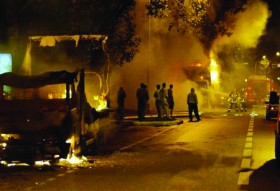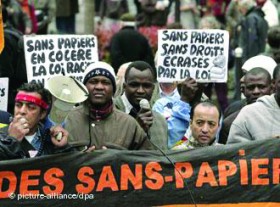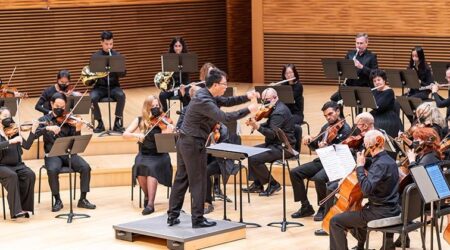Tensions of Immigration in France
French politicians have their agendas full as they flock to Paris. In addition to economic reforms during these challenging times, the French people are demanding the introduction of functional immigration policies. French natives and immigrants from around the world are hitting the streets of Paris voicing many different views on immigration. These opposing opinions have […]
French politicians have their agendas full as they flock to Paris. In addition to economic reforms during these challenging times, the French people are demanding the introduction of functional immigration policies. French natives and immigrants from around the world are hitting the streets of Paris voicing many different views on immigration. These opposing opinions have created a visible and possibly irreparable divide throughout France. The tension is palpably uncomfortable as the French and immigrants alike strive to coexist while waiting on the government to announce new policies that could change the way of life for anyone living in France.
Immigration in France is not a new phenomenon. In fact, it has been a steady part of France throughout history. In relatively recent history, France, like many other European countries, recruited foreign workers during the economic uproar of the 1950s and 1960s following World War Two. Most of these workers were male from neighboring Italy, Portugal, Spain, Belgium, Germany, and even Poland and Russia. During the 1960s, after the French-Algerian war, France opened its doors to many pro-French supporters from Algeria. In the 1970s, France stopped recruiting foreign workers due to economic uncertainty, and in the 1990s the Pasqua policies were introduced: Zero Immigration. In 2006, the Law of Equal Opportunities was passed, attempting to limit discrimination. Today, immigration is just as debated as it was six and a half decades ago, and the tension is as high as ever.
Over the years, the back and fourth ideology behind immigration reforms have left immigrants understandably confused. On one side, the French government boasts equality for all while on the other hand, certain politicians, currently experiencing rising popularity, are making public comments that suggest the opposite of equality for all.
“I will not open the doors [wide] of my country to those [people] who are incomplete!” This is a quote from French politician Marine le Pen of the National Front Party. The last part of that statement is clearly unfavorable to any immigrant living in France. As might be expected, immigrants have not responded well to such sentiments over the years. They feel unwanted, mistreated, and racially discriminated against in a country they want to call home.

The immigrants are not the only ones taking to the streets in protest over failed immigration reforms. A number of the French population has expressed their outrage over the increased number of “unskilled” immigrants “taking over” their country. The overall impact has left natives of France feeling threatened, angry, financially drained, and “unwelcomed” in their own country – an unavoidable recipe for high tensions and racial intolerance.
There is no denying that the French government plays a large role in the current immigration situation. The tension felt in Paris and throughout France can be linked to past government decisions. In the Parisian region of France, Ile-de-France, there is a large expansion of suburbs, mostly occupied by immigrants and their families. These suburbs are not like the quiet, middle class dwellings that Americans associate with the term “suburb.” Instead, these Parisian suburbs consist of “project” type social housing. The standard of living is far below that of the average French town, the violence and drug-related incidents are amongst the highest in France, and the school system is below the average French education standard. Amongst these dilapidated buildings live first-, second-, and third-generation immigrants who were placed there decades ago as a way to “deal with” the immigrant population. Over time they grew resentful of segregation, peering beyond to the City of Light, feeling that they are not allowed to have that French lifestyle.
Recognizing past failures to combat immigration, the French government is determined to solve the problem. The new French Interior Minister, Manuel Valls, a naturalized French citizen originally from Spain, plans to make a few changes to immigration policies in France. He first wants to change who holds the power to decide whether or not an immigrant qualifies for citizenship. Currently, the individual Prefectures allow individual agents to make the final decision. Too many agents allow personal opinions or prejudices to dictate their decisions, rather than following the procedure and verifying paperwork. As a foreigner in France, I can personally attest to this problem. If an agent doesn’t like you, or your country of origin, then your life will be miserable for a long time. Valls also plans to abolish the French Culture and History Test that immigrants are currently obligated to take for citizenship.
In 2008, there was estimated to be 11.8 million foreign-born immigrants and their descendants, making up 19% of the French population. The majority of immigrants are: of European origin (5.5 million) and of Maghrebi origin, mainly from Algeria, Morocco, or Tunisia (4 million). Sixty percent of these immigrants reside in only four regions of France: Ile-de-France, Rhone-Alpes, Provence, or Cote d’Azur. Besides Africa and Europe, the highest number of immigrants comes from Vietnam, Cambodia, and Senegal. Americans make up the least amount of immigrants living in France. Regardless of their origin, every immigrant feels the impacts of these policies.
Immigrants in France feel like second-class citizens. The educational and career opportunities differ for immigrants depending on their origins. Despite the law, there is no equality for everyone. The equality for all law forbids any personal information such as a photo, name, gender, or nationality being required on a job resume. However, even if an immigrant or even a second- or third-generation descendant of an immigrant obtains an interview based on his/her merits, the employer can still deny employment upon sight of the potential employee. This is an illegal, yet common enough problem in France today. The immigrants feel segregated, unwelcome, and as a result, protests arise – sometimes even violent ones. The 2005 riots in the suburbs of Paris, for example, resulted in a wake-up call to the French government as people were killed, injured, and cars burned in the streets as young second- and third-generation immigrants decided that patiently waiting for equality was no longer an option.

France has fewer immigrants than other European countries such as Spain and England. Eighty-five percent of the French population is white, and unemployment of immigrants in France is double that of French natives. Despite these facts, 70% of French people said in a 2013 French survey that there were too many immigrants in France. In a 2014 Global Attitude survey, 52% of France stated that immigrants were a burden to France – a strain on social benefits and the fragile job market. Alain Finkielkraut claims in his book, The Unhappy Identity, that immigration is destroying the French cultural identity. The widespread circulation of such opinions has had an impact in the country.
There is no denying the tension that is felt throughout France, especially in areas with the highest percentages of immigrants. To call the general French population racist however, may be inaccurate. Listen hard enough and you will here a plethora of rude comments from the French as well as from immigrants. The bottom line seems to be that the French fear immigrants and the changes they will inevitably bring to France, and it is this fear that is coming across as dislike and intolerance. This angst is fueled by the five million Muslim immigrants currently living in France. Whereas many of them operate as smoothly in French society as anyone else, there are a handful of extremists making public promises that the French view as threats. These extremists take to the streets stating that they are there to take over France, and estimate based on the birthrate of immigrants that France will be an Islamic nation within thirty-nine years. Already there are demands from Muslim groups to change certain key points of French culture: no more Santa Clause making school visits during the holidays, no more pork distribution in certain restaurants, no more alcohol being sold in certain establishments, the want of separate living communities, more mosques, less rights for women, and the right to stop in the streets on Fridays and pray, en masse. With the exception of women’s rights, many of these changes are already occurring in Paris and this has the French scared for the preservation of their culture. Hopefully, France has nothing to fear, because the majority of Muslims living in France simply want to be a part of French society as it is, while reserving the right to peacefully practice their religion.
There are signs in France that even racial tensions are high. As an American in France, I experience my daily dose of intolerance and mistreatment. However, the French do treat European and American immigrants differently from those of North African origin. I can only speak from my personal experience, but as a sort of “middleman,” I have witnessed the intolerance from both sides. I have heard North Africans in both public protests as well as individual conversations state that, “There are too many white people in Paris,” or “White people leave!” I have also heard very rude comments made towards North Africans, too rude to express here. In certain districts of Paris I have witnessed complete gridlock and disruption of businesses while an entire street is used for Muslim prayer. During the prayer session, however, people were simply irritated that they had to wait. I didn’t personally hear any inappropriate comments about the reason behind the disruption. More than anything, the French do not want to change their current way of living too drastically; They fear change and any reason behind that change.
Immigration is a hot topic in France today, as it is in many other countries. Mistakes made by past government officials have affected the immigrant culture that exists today in France. The immigrants act out in protest, leading to unfavorable opinions from the majority of the French population. There is a deep misunderstanding resulting in intolerance and racism. The immigrants want to assimilate without losing too much of their original identity, while the French want the immigrants to assimilate without changing the French identity. As Arthor Claude Askolovitch writes in Our Unloved Ones, These Muslims Which France Does Not Want, “A farewell to France as we know it,” meaning that France is now a multicultural country and the French must learn to adapt.
Jacqueline Perrier-Gillette is currently a resident of Paris, France, where she lives with her husband. Together the two of them operate their small translation company, giving Jacqueline the opportunity to observe the French and their culture up close. She is an avid reader, writer, and student of foreign languages.
By Jacqueline Perrier-Gillette





